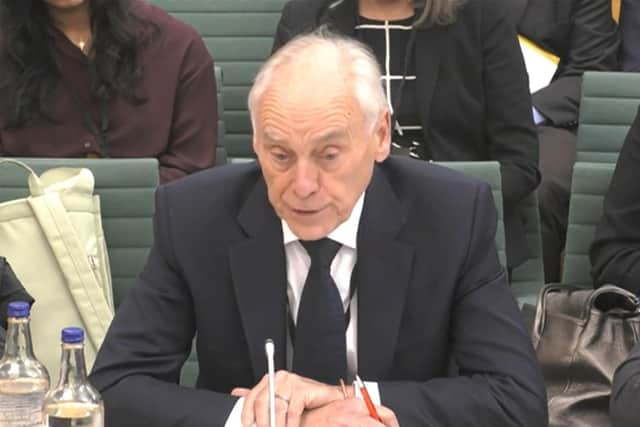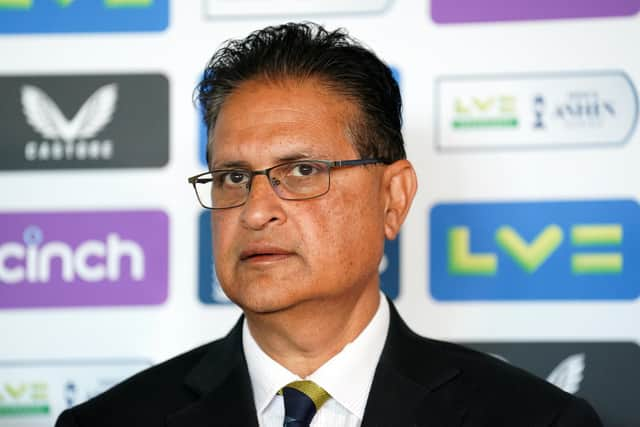Colin Graves and Harry Chathli see off Alex Sobel inquisition - Chris Waters
Granted, Graves looked a little discomforted at times - hardly surprising given the battering he has taken and continues to take, despite having received no complaints of racism during his first spell as chair, having not been named in any of the investigations - let alone charged - or even been present at the club during the complainant’s second spell.
Somehow, this 76-year-old who has done so much for the game and for cricket in Yorkshire - even if some of us can agree to disagree about The Hundred (yuck) - has been held up as some sort of scapegoat, some throwback to antiquity.
Advertisement
Hide AdAdvertisement
Hide AdAnd what a sad state of affairs it is when somebody who clearly has a different view on an extremely complicated story - i.e., what was the truth of what happened at Yorkshire, as opposed to the spin and soundbites preferred by politicians - is effectively demonised for having that view.


Graves and Chathli were impressive under pressure.
Much of it fell on Graves, of course, whose return to Yorkshire cricket has sparked much debate.
None more so, in fact, than when both were grilled simultaneously by Alex Sobel, the newest member of the CMS, whose constituency covers the Headingley region.
Sobel rather telegraphed the tone that his questioning might take when he tweeted several weeks ago that we “don’t need people like Colin back at the club”.
Advertisement
Hide AdAdvertisement
Hide Ad

Part of his case during Tuesday’s hearing was that Graves had been less than candid about his plans for that club in terms of whether it would stay in the control of its members.
Having elicited from Graves a negative response as to whether demutualisation (turning Yorkshire into a plc) was part of his initial refinancing offer to return as chair, Sobel pulled out a letter that was apparently sent by Graves last September to the outgoing board.
“Do you recognise the letter, Mr Graves?” said Sobel, brandishing it in the manner of coup de grace evidence.
Graves peered at it from a distance of several yards away, like a man straining to pick out the wording on a road sign.


“No, I don’t, actually,” he replied.
Advertisement
Hide AdAdvertisement
Hide Ad“Ok, well I’m going to quote from the letter,” said Sobel, who stated that it included the line “YCC converting from a mutual society into a private limited company”.
He added: “So you’ve just said initially to me that you weren’t seeking demutualisation.
"This letter is then conditional on demutualisation.”
Some back-and-forth followed in which Graves clarified that this was not the final offer that the Yorkshire board accepted, although it perhaps betrayed the direction of travel that the club might take in a changing sporting climate.
That there are many important questions around the subject of demutualisation, though, and whether Yorkshire would, in fact, be better off going down that route - as more counties are likely to do in the future - was apparently lost on Sobel, whose probing was fair enough in one way but took no account of the broader topic and seemed intended, primarily, to inconvenience Graves.
Advertisement
Hide AdAdvertisement
Hide AdChathli then told Sobel the reality of the matter - namely, that the outgoing board could have sold Yorkshire to “a significant number of parties”, but there was no guarantee that the club’s members would have accepted.
“You cannot guarantee the outcome because demutualisation requires the members to vote on it and accept it,” said Chathli.
Earlier in the hearing, Sobel had made a point of asking Richard Gould, the chief executive of the England and Wales Cricket Board (ECB), whether the governing body would have allowed Yorkshire to enter administration (which Chathli said was the only viable alternative to Graves), to which Gould replied: “No.”
On that basis, Sobel said that Chathli’s claim was clearly incorrect but Chathli explained that the resulting loss of Test cricket - as happened to Durham, when they hit financial problems and had to be bailed out by the ECB - would have had a major knock-on effect on sponsorship, the ability to pay creditors, and so on.
Advertisement
Hide AdAdvertisement
Hide Ad“What is the future of Yorkshire County Cricket Club under ECB rule when all of that has been stripped away from the club?” said Chathli, adding that the board took its directors’ and fiduciary duties seriously and legal advice every step of the way. “I could not see a viable option in that.”
At the end of it all, it wasn’t really clear what Sobel was trying to achieve.
Would he have preferred the county cricket club in his constituency to have gone into administration?
Is Colin Graves really that bad?
Comment Guidelines
National World encourages reader discussion on our stories. User feedback, insights and back-and-forth exchanges add a rich layer of context to reporting. Please review our Community Guidelines before commenting.